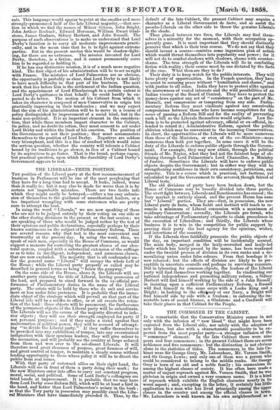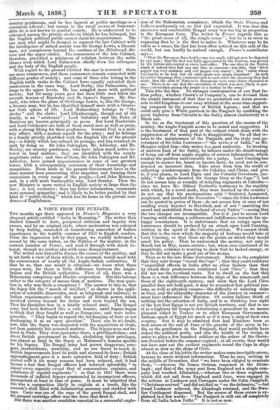THE COMMONER IN THE CABINET.
IT is remarkable that the Conservative Ministry comes in not only with the infusion of "new blood" that might have been expected from the Liberal side nor solely with the adoption of new ideas, but also with a characteristic peculiarity to be ex- pected from the most popular party—a stronger infusion of the "commoner" element. In the fate Cabinet there were nine peers and four commoners; in the present Cabinet there are seven noblemen and five commoners : but the distinction is not obvious alone in the statistics of titles. The commoners in the late Ca- binet were Sir George Grey, Mr. Labouchere, Mr. Vernon Smith, and Sir George Lewis ; and only one of them was a person who could be considered to belong to the middle ranks. Sir George Grey is born of an old and a noble family ; his connexions he among the highest classes of society. It has often been made a matter of unjust reproach against Mr. Vernon Smith, that he was plebeian in origin and owned a very common name. It is a kind of reproach which exhibits the English character nearly in its worst aspect ; and, excepting in the letter, it certainly has little application to a man who has lived principally among the upper classes in the country and among the official classes in town. Mr. Labouchere is well known in his own neighbourhood as a
country gentleman, and he has figured at public meetings as a consistent Liberal ; but except in the rural scenes of Somerset- shire he is not known to general society. He is understood to be esteemed among the private circles to which he has belonged, but the English political public cannot claim his acquaintance. The one man who might be deemed to connect the late Cabinet with the intelligence of mixed society was Sir George Lewis a literary man, not conspicuous beyond the confines of the Edinburgh Re- view and the upper circles. The commoners of the late Cabinet, therefore, presented a minimum of relation between the noble classes from which Lord Palmerston chiefly drew his colleagues and the body of the English people. With regard to the present Cabinet the case is reversed : there are more commoners, and those commoners remain connected with different grades of society ; and some of those who belong to the English noble ranks in the Cabinet have equally extended their connexions in the same way. Lord Derby, like Palmerston, be- longs to the upper levels. He has mingled more with political society, but for many years past has been little seen below the seventh heaven of Knowsley and St. James's Square. Mr. Dis- raeli who takes the place of Sir George Lewis, is, like Sir George,
a literary man, but he has identified -himself more with a Grosve- nor Gate sphere of life. Lord Malmesbury belongs to "the circles" and, the clubs ; Lord Ellenborough, though not of old family, is an "aristocrat"; Lord Salisbury and the Duke of Montrose are known principally as peers. But Lord Hardwicke and Lord Colchester are both of them naval men as well as peers, with a strong liking for their profession. General Peel is a mili- tary officer, with a zealous regard for the army ; and he belongs to a family strictly identified with the English life of the present day—a family which has refused its peerage, and has retained its rank by doing so. Sir John Pakington, Mr. Adderley, and Mr. Henley, are country gentlemen, who have taken much active in- terest in local matters; they are identified with the county magistrate order ; and two of them, Sir John Pakington and Mr. Adderley, have gained acquaintances in some of our greatest towns, with a corresponding extension of their knowledge and sympathies. Even lords in the present Government have in the same manner been prosecuting their inquiries and forming their connexions in every range of the people —Lord John Manners, and, in a still more businesslike way, Lord Stanley. Thus the new Ministry is more rooted in English society at large than the late ; is less exclusive ; thus has better information, commands more personal sympathy, and is likely to be better guided. by that kind of "public feeling" which has its home in the private resi- dences of Englishmen.



































 Previous page
Previous page